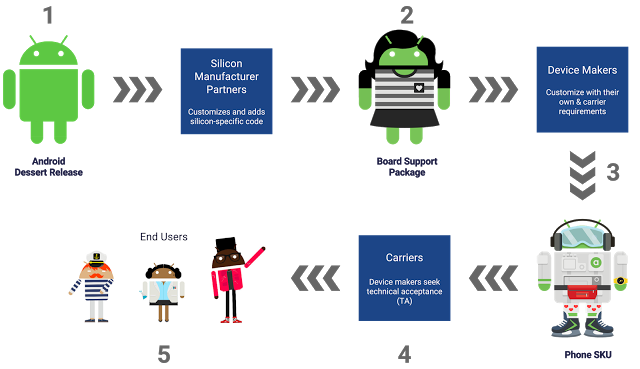Google's Project Treble will make Android updates faster for all devices

It's just five days until the Google I/O keynote but the company can't help itself: it has pre-announced what could be one of the most important changes to Android since its inception.
Called Treble, the project involves making it easier for Android manufacturers and carriers to roll out updates to their devices by creating a set of tests aimed at the vendors that create the components inside phones, tablets and anything else running Android. From Google:
Project Treble aims to do what CTS did for apps, for the Android OS framework. The core concept is to separate the vendor implementation - the device-specific, lower-level software written in large part by the silicon manufacturers - from the Android OS Framework. This is achieved by the introduction of a new vendor interface between the Android OS framework and the vendor implementation. The new vendor interface is validated by a Vendor Test Suite (VTS), analogous to the CTS, to ensure forward compatibility of the vendor implementation.
Like the CTS, or Compatibility Test Suite, the VTS will ensure that all the chips inside the phone, from the SoC to the baseband to the tiny little sensors that let our phones do amazing things, work properly when Google releases a new version of Android.
Here's the amazing part: Treble will allow the Samsungs, LGs and Huaweis of the world to push out updates without having to rely on the Qualcomms and Broadcoms to make large changes to the underlying core Android framework.
With a stable vendor interface providing access to the hardware-specific parts of Android, device makers can choose to deliver a new Android release to consumers by just updating the Android OS framework without any additional work required from the silicon manufacturers.
Google says that all phones and tablets running Android O and later will incorporate Project Treble, and that the first Android O Developer Preview already has it, waiting patiently for the VTS to roll out.
The company has been working towards this day for a long time, from splitting the carrier and vendor updates into separate partitions in Android M to making it easier for manufacturers and carriers to roll out specific, core OS updates with Android N.
Finally, Google is working with those same companies to entice them to bring core Android changes and bug fixes — from country and carrier-specific improvements to actual features — and bring them into the Android Open Source Project. Not only will this make Android more stable from the get-go, it will allow manufacturers to compete less on software differentiation than hardware, hopefully improving the experience for everyone.
Get the latest news from Android Central, your trusted companion in the world of Android
While we'll likely learn more next week at Google I/O, what remains to be seen is whether manufacturers will work with Google and the component vendors to ensure this process is smooth, or even whether Google will enforce the VTS the way it currently does the CTS. Lots more to come, so stay tuned to Android Central for all the details!

Daniel Bader was a former Android Central Editor-in-Chief and Executive Editor for iMore and Windows Central.
